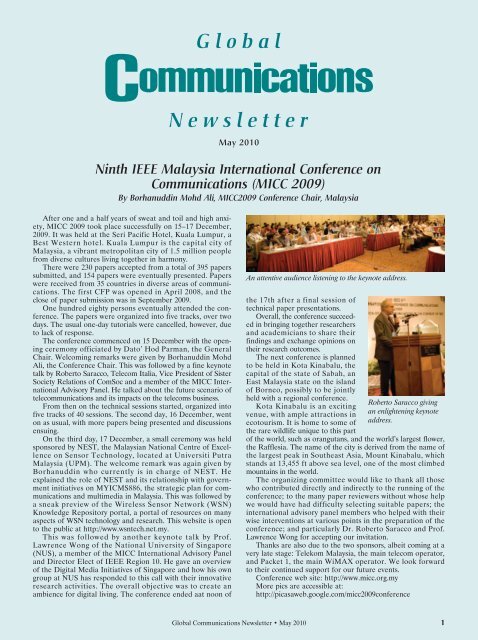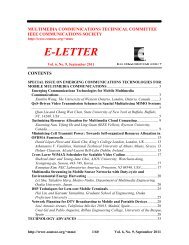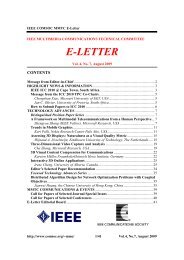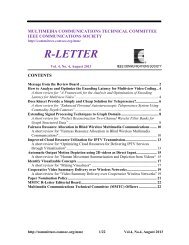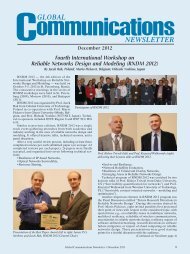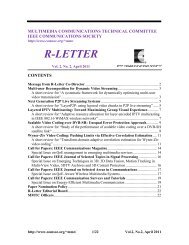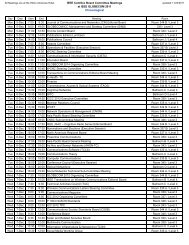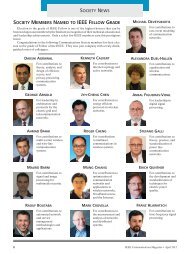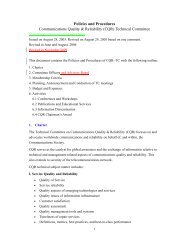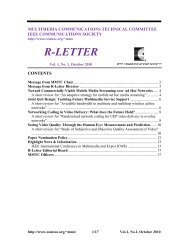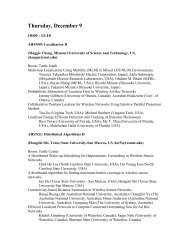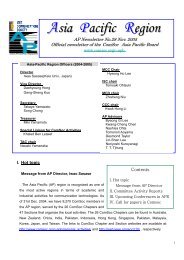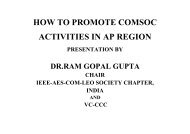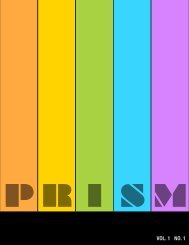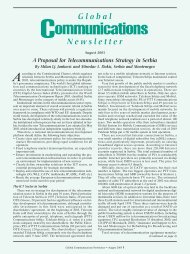May - IEEE Xplore
May - IEEE Xplore
May - IEEE Xplore
Create successful ePaper yourself
Turn your PDF publications into a flip-book with our unique Google optimized e-Paper software.
A New Conference Experience: A Short Report on <strong>IEEE</strong> SoftCOM 2009By Dinko Begusic and Nikola Rozic, Program Co-Chairs, CroatiaThe 17th International Conference on Software, Telecommunicationsand Computer Networks (SoftCOM 2009) washeld in the attractive ambience of the Amfora hotel on theisland of Hvar on 24 and 25 September, and aboard the cruiseship Marko Polo on September 26, visiting Korcula and Split.The Conference was organized by the University of Split, Facultyof Electrical Engineering, Mechanical Engineering andNaval Architecture, and CCIS under the auspices of the Ministryof Science, Education and Sports, and the Ministry of theSea, Tourism, Transport and Development. The Conferencewas technically co-sponsored by the <strong>IEEE</strong> CommunicationsSociety (ComSoc). This conference was endorsed by the TechnicalCommittee on Comunications Software (TCCS).Researchers and experts from industry, research institutes,and universities from 30 countries all around the world submittedin total 193 papers for presentation at SoftCOM ’09.Submitted papers were reviewed by more than 215 scientistsfrom universities, institutes, and ICT companies all over theworld. All accepted papers were carefully selected based ontheir contribution, relevance, conceptual clarity, and overallquality. Nearly 40 percent of submitted papers were recommendedfor presentation within the conference technical program.The conference program featured nine general conferencesessions, a symposium on environmental electromagnetic compatibility,and four special sessions dedicated to the mostpractical topics in the area of mobile and wireless communications.A professional workshop dedicated to the wide spectraof topics in ICT was held too. In addition, three half-day tutorialswere held by internationally recognized experts. A specialsession dedicated to Ph.D. students featured presentations ona range of research topics.The inspiring plenary speech titled “How Adaptive TechnologiesCan Lead to a User Centered Service Platform” wasgiven by Roberto Minerva (Telekom Italia, Future Centre andTechnical Communication Department). It engendered anumber of lively discussions among participants.The Workshop on Education in ICT featured presentationsby representatives from leading Croatian academic institutions,the Universities of Zagreb and Split. Zoran Skocirfrom the Faculty of Electrical Engineering and Computing(University of Zagreb) and Tomislav Kilic, dean of the Facultyof Electrical Engineering, Mechanical Engineering andNaval Architecture (University of Split) presented the experiencesand results after four years of new study programs inthe area of ICT formed in accordance with the Bologna declaration.The representative of the largest ICT company inCroatia, Ericsson Nikola Tesla, Goran Skugor, presented hisviews of education processes in the area of ICT. Stipe Celar, aThe Deocletian Palace in Split.The keynote speech was given by Roberto Minerva (Telekom Italia,Future Centre and Technical Communication Department).member of the research team of the international Tempusproject aimed at internationalization of software engineeringin Croatia, presented the results of the project.In conjunction with SoftCOM ’09, a Business Forum wasorganized featuring workshops, invited talks, round tables, andpresentations with participation of managers, executives,experts, and government and institution representatives whodiscussed and exchanged opinions and experiences on a numberof hot topics in contemporary and future ICT industry andmarket including business, technological, and social aspects.Drazen Lucic, director of the Croatian agency for post andelectronic communications, held a presentation titled “AnOverview and a Forecast of Electronic Communications Marketin the Republic of Croatia.” Tomislav Vracic from the centralstate office for e-Croatia presented a talk titled“Implementation of the e-Government Strategy in Croatia.”Antun Caric and Silvije Seremet from the Croatian agency forpost and electronic communications presented the talk “E-Agency: Implementation of the Croatian Post and ElectronicCommunications.” Kreso Antonovic, director of the directoratefor electronic communications and postal services, held the talk“Analog to Digital Television Broadcasting Switchover Strategyin Croatia — The Status of Implementation.”The conference participants had an opportunity to visit theislands of Hvar and Korcula, highly appreciated touristresorts. The participants enjoyed a particularly warm welcomereception by the <strong>May</strong>or of the town of Korcula, enjoying theunique taste of local fruits, sweets, and wine in a friendlyatmosphere. After the reception participants had a chance totake a walk along the old town streets. A guided tour alongthe ancient walls gave participants another attractive view ofthe city.The SoftCOM ’09 journey finished in Split, the largest cityon the Croatian coast of the Adriatic Sea and the capital ofthe County of Split and Dalmatia with a population of 400,000.The visit to Split offered participants an extraordinary citytour. The uided tour started in front of the Sveti Frane churchat the western end of Riva. The participants had a chance topass along the south promenade of the Palace and feel a lightbreeze blowing from the sea, welcoming them to this town.A welcome reception by Ms. Nansi Ivanisevic, the Counsellorof the <strong>May</strong>or of the Town of Split, was organized in theDiocletian Palace Basement.Popular old Dalmatian dances and songs performed by thefolk ensemble “Jedinstvo” offered participants attractiveglimpses of the tradition and culture of Dalmatia.2Global Communications Newsletter • <strong>May</strong> 2010
Fifth International FOKUS IMS Workshop 2009, Berlin, GermanyBy Prof. Dr. Thomas Magedanz, General Chair, Senior Member <strong>IEEE</strong> ComSoc, GermanyThe 5th International FOKUS IMS Workshop on NextGeneration (Mobile) Networks and the Future Internet —Towards Rich Communications and Interactive Media washeld in Berlin, Germany, on 11–12 November, 2009 at thepremises of Fraunhofer Institute FOKUS. Around 200 peoplefrom 29 nations, many of them <strong>IEEE</strong> ComSoc members,attended this year’s event, classifying it as one of the biggerconferences in 2009. The workshop was part of a series ofFOKUS events on innovative multimedia services and relatedenabling technologies as well as protocols in the field of nextgenerationnetworks (NGNs), next-generation mobile networks(NGMNs), including the related evolved packet core(EPC), and the future Internet (FI). The workshop series wasoriginally devoted to the IP multimedia subsystem (IMS), butits scope has grown tremendously over the last years, as thescope of IMS and related technologies has also extended inview of progressing convergence of networks and services.Unlike previous events, this year’s event ran four closelyrelated tracks in parallel on the first day. Each area featuredits own tutorial in the morning and interactive workshop inthe afternoon.Track 1, “Rich Communications and Telco 2.0,” representedthe major pillar of this workshop series as this topic hasbeen covered since the first workshop. The tutorial “OpenApplication Programming Interfaces (APIs)” was attended by50 delegates, and provided an overview of services principles,architectures, standards, services, and service creationapproaches and tools for telecommunications and the Internet.The workshop “Facing the Technology Landscape beyondVoice” has been attended by 60 delegates. In two interactivesessions we looked at principles for open APIs and serviceenvironments in a converged web/telco service system fromtwo perspectives: service platforms in the network (presentationsby trommsdorff + drüner, OMA, Sunrise, BT, NTT, andDT Developer Garden) and client architectures (presentationsby Bell Labs, TNO, T-Labs, Siruna NV, W3C, andOMTP).Track 2, “IPTV and Media Convergence,” also representeda classic topic, which was added in 2007 to the event’s scope.The tutorial “Rich Media and Convergence” was attended byaround 30 participants from different professions. The tutorialgave deep insight on the different topics driving the developmentsinside the current (IP)TV domain. The workshop“IPTV and Media Convergence” was attended by around 50delegates, and addressed the challenges and opportunities foroperators, vendors, content providers, and the advertisingindustry in a converged services world. Representatives fromall these stakeholders — Intel, Sony, Philips, IRT, Detecon,Mediengruppe RTL, Alcatel-Lucent, Google/YouTube,Microsoft, Novay, RTV Media Group, MMH, STC, and TNO— expressed their views, followed by committed discussionswith and among the audience.Track 3, “Future Internet,” represented a new track. The“Future Internet Technologies” tutorial addressed the topicsof network virtualization, functional composition, autonomiccommunication, content-centric networks, and delay-/disruption-tolerantnetworks (DTNs). The second part introducedpeer-to-peer P2P concepts, as well as P2P and P4P evolution.The third part covered methods to assess future Internet solutions.The corresponding workshop, “Future Internet — WhatCan We Use Today?” was attended by around 40 delegates.In her opening keynote Graca Carvalho (Cisco Systems)showed how demands from mobile networks and cloud com-(Continued on Newsletter page 4)ICUMT 2009 Conference in St. Petersburg, RussiaBoris Sokolov, Vladimir Vishnevsky, Alexey Vinel, Gennady Yanovsky, Yevgeni Koucheryavy,and Dmitry A. Tkachenko, RussiaThe International Conference on Ultra Modern Communicationswas held in St. Petersburg, Russia, on 12–14 October,2009. The conference was organized by SPIIRAS (an instituteof the Russian Academy of Sciences), St. Petersburg Universityof Telecommunications, and Tampere University of Technology,Finland. The <strong>IEEE</strong> Russia Northwest BT/CE/COMChapter was a technical co-sponsor of the conference alongwith the Popov Society (a professional society of Russianradio and communications engineers). Patrons and supportersof the conference were the government of St.Petersburg,Nokia, Nokia Siemens Networks, and other organizations.The technical program of ICUMT 2009 included ninekeynote talks by internationally recognized industrial and academicspeakers, 13 specialized workshops, and the main conferencetrack. Conference proceedings include more than 300papers that were selected from more than 500 submissionswith the help of more than 300 Technical Program Committeemembers, reviewers, and workshop chairs. The conferencewas attended by over 350 participants.New insights in radio technologies as well as networkingaspects of wireless communications systems were key topics ofthe conference. Keynote speakers presented insights andtrends in LTE, <strong>IEEE</strong> 802.16 and WiMAX, <strong>IEEE</strong> 802.11, thefuture Internet, and other topics. Significant scientific contributionswere presented in the areas of relaying technologies inmodern wireless communications, mobile ad hoc networking,numerical methods of queuing theory, adaptive self-improvingA group of participants of the conference from different countriesafter the conference party.web tools capable of learning and understanding contents, andpredictive routing algorithms in the future Internet. Papersconcerning many other technical fields and technologies werealso presented and discussed at the conference, such as wirelesssensor networks, wireless network protocols, physicallayer issues for wireless networks (e.g., multiple-input multipleoutput [MIMO], orthogonal frequency-division multiplexing[OFDM], and ultra wideband [UWB]), cross-layer optimization,and RFID technologies.The conference was really international, with speakers andattendees arriving in St. Petersburg from 45 countries. Theconference proceedings are available in <strong>IEEE</strong> <strong>Xplore</strong>. Someresults of the conference are also available at the conferenceweb site, http://www.icumt.org/.Global Communications Newsletter • <strong>May</strong> 2010 3
FOKUS IMS WORKSHOP/continued from page 3puting put more and more pressure on today’s networks. Thesecond part of the workshop, under the motto “How FIT isyour network?” was dedicated to the preparation of the firstfuture Internet Tournament in 2010.Track 4, “NGMN and Evolved Packet Core (EPC)” wasalso new and motivated by the current hype around LongTerm Evolution (LTE) and the corresponding emergingnotion of NGMN. The tutorial “NGMN and Related Technologies— LTE, EPC and IMS” introduced the terminology,key concepts, and architectures, as well as the related 3GPPevolved packet system (EPS) standards. A major focal pointwas the evolved packet core (EPC) and its relationship toIMS. In the correlated workshop experts from research andindustry, such as Fraunhofer HHI, Deutsche Telekom AG,Vodafone, the University of Aveiro, mobilkom austria, Swisscom,and SAP, presented their latest results and visionsregarding LTE and NGMN applications.The main conference, entitled “Rich Communications andMedia Services above Smart Broadband Bit Pipes and theFuture Internet,” on the following day aimed to unite the differenttracks and attracted around 180 attendants. The firstsession, “Open APIs for Rich Communications in ConvergedNetworks,” discussed different approaches to opening up thenetwork and/or end systems for converged service provisionfrom the standards and operator perspectives.Session two, “Rich Media,” compared emerging interactiveIPTV standards and operator platforms with alternativeapproaches from the Internet community providing gamingand targeted content.The afternoon started with a technical keynote, “PreventingCongestion Collapse of SIP Servers,” by Prof. Dr. HenningSchulzrinne, Columbia University, New York City, which wasfollowed by a vendor panel discussion on “How to Get toNGN and How to Get from NGN to Future Internet?”The final session was devoted to the evolution of NGNtoward the future Internet by looking at future Internet experimentalplatforms, the impacts of P2P and cloud technologieson NGNs, as well as how new future Internet concepts such as“identifier/locator split” work.Presentation slides from the 56 talks being of high interestto <strong>IEEE</strong> ComSoc members may be downloaded from http://www.fokus.fraunhofer.de/go/ims-event/download. Pictures canbe found in the gallery at http://www.fokus.fraunhofer.de/go/ims-event/pictures .Alongside the workshops and conference vendor exhibitionswere shown the state of the art of NGN service deliveryplatforms (SDPs), as well as the newest NGMN toolkits fromFraunhofer FOKUS: the universal client framework myMON-STER (www.mymonster.org) and the NGMN prototyping platformOpenEPC (www.openepc.net).As announced in the closing session, the classical FOKUSIMS Workshop series has come to an end with its fifth iteration.But as this workshop series represents a globally uniqueforum, providing a premier information source and technicalnetworking platform for international experts from the relatedindustries and well-known academic institutions, plans areunderway to continue the workshop series under the banner ofsome major <strong>IEEE</strong> ComSoc conference, such as GLOBECOMor ICC. However, this is some time ahead, and we thereforepoint the interested reader to our website, http://www.fokus.fraunhofer.de/go/ims_event, which we will use to announce thelatest information about future events.G l o b a lN e w s l e t t e rwww.comsoc.org/pubs/gcnSTEFANO BREGNIEditorPolitecnico di Milano - Dept. of Electronics and InformationPiazza Leonardo da Vinci 32, 20133 MILANO MI, ItalyPh.: +39-02-2399.3503 - Fax: +39-02-2399.3413Email: bregni@elet.polimi.it, s.bregni@ieee.org<strong>IEEE</strong> COMMUNICATIONS SOCIETYKHALED B. LETAIEF, VICE-PRESIDENT CONFERENCESSERGIO BENEDETTO, VICE-PRESIDENT MEMBER RELATIONSJOSÉ-DAVID CELY, DIRECTOR OF LA REGIONGABE JAKOBSON, DIRECTOR OF NA REGIONTARIQ DURRANI, DIRECTOR OF EAME REGIONZHISHENG NIU, DIRECTOR OF AP REGIONROBERTO SARACCO, DIRECTOR OF SISTER AND RELATED SOCIETIESREGIONAL CORRESPONDENTS WHO CONTRIBUTED TO THIS ISSUEBORHANUDIN MOHD ALI, MALAYSIA (BORHAN@ENG.UPM.EDU.MY)THOMAS BOHERT, SWITZHERLAND (THOMAS.MICHAEL.BOHNERT@SAP.COM)JOEL RODRIGUES, PORTUGAL (JOELJR@<strong>IEEE</strong>.ORG)A publication of the®<strong>IEEE</strong> Communications Society4Global Communications Newsletter • <strong>May</strong> 2010


